This collection of worksheets offers short reading passages about the lives and work of famous scientists. Students will learn about scientists in many different disciplines, and discover why their contributions to knowledge are so important. Each short essay is accompanied by two answer sheets (multiple choice and short answer), as well as a one page "organizer," in which students can note short facts about the person. Answer keys are provided for each sheet. This section of our site will look at the people that are widely thought to have offered the greatest contributions to the science field in either capacity. Project idea: Have your students present a science fair project in the persona of a famous scientist. Louis Pasteur and germ theory, for example.
Print Influential Scientist Worksheets
Click the buttons to print each worksheet and associated answer key.

Albert Einstein Reading Worksheet
Perhaps one of the most famous scientists of all time, Einstein is known as "the greatest genius of the 20th century."

Einstein Organizer
He was unable to find work as a teacher, so he went to work at the Swiss Patent Office.

Einstein Multiple Choice Questions
In 1921 he won the Nobel Prize in Physics for his discovery of the photoelectric effect.

Einstein Short Answer Questions
Have you ever wondered, "Why is the sky blue?" Einstein wrote a complicated equation which answered this question.

Galileo Galilei
Using precise measurements, he created the law of falling bodies. He made a telescope, which he used to study lunar craters.

Galilei Organizer
He is seen as the first scientist to use a telescope to make important astronomical discoveries.

Galilei Multiple Choice Questions
Galileo was a university professor, and was required to teach the beliefs of the time rather than this new sun-centered theory.

Galilei Short Answer Questions
Galileo is well respected within the science community, largely because of his excellent scientific techniques.

Charles Darwin
Darwin's work taught us about evolution by natural selection - explaining how living things grow, survive, and evolve by adapting to their natural surroundings.

Darwin Organizer
Darwin studied at Edinburgh University. While he was supposed to be studying medicine, he was actually already interested in life forms and their creation: he studied marine invertebrates.

Darwin Multiple Choice Questions
Darwin was reluctant to publish his book, because his findings were in conflict with the beliefs of evolution at the time.

Darwin Short Answer Questions
Charles Darwin went on to study plants, emotions in man and animals, and earthworms and their effect on soil, as well as many other subjects.

Sir Isaac Newton Reading Worksheet
He was an astronomer, a mathematician, an alchemist, and a physicist. He created many laws that are still used today.

Newton Organizer
He went on to Trinity College in Cambridge. Here, he developed something we know today as "calculus." Calculus is defined as "the study of how things change," and is a mathematical process.


Newton Short Answer Questions
Newton held the position of Chair of Mathematics at Cambridge for 33 years.

Edwin Hubble Reading Worksheet
Hubble was an American astronomer who forever changed the way we look at the sky.

Hubble Organizer
One of Hubble's most notable achievements was that he proved that there are other galaxies in the sky.

Hubble Multiple Choice Questions
He compared the brightness of stars to how much light they were actually giving off, allowing him to estimate their age. This helped prove that the universe was growing, and determined that the universe is actually hundreds of millions of light-years old.

Hubble Short Answer Questions
His findings gave Hubble a celebrity status in the thirties and forties, and he was friends with many Hollywood big-shots, including Charlie Chaplin.
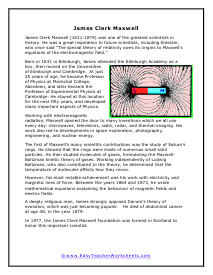
James Clerk Maxwell Reading Worksheet
The special theory of relativity owes its origins to Maxwell’s equations of the electromagnetic field.
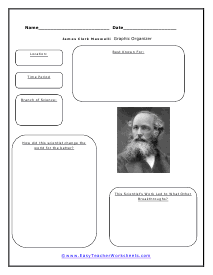
Maxwell Organizer
Working with electromagnetic radiation, Maxwell opened the door to many inventions which we all use every day: microwaves, televisions, radio, radar, and thermal imaging.

Maxwell Multiple Choice Questions
The first of Maxwell’s many scientific contributions was the study of Saturn’s rings. He showed that the rings were made of numerous small solid particles.
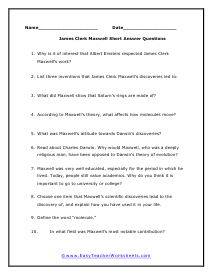
Maxwell Short Answer Questions
A deeply religious man, James strongly opposed Darwin’s theory of evolution, which was just becoming popular.
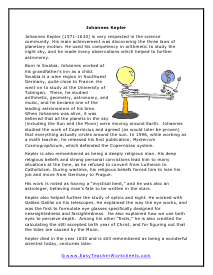
Johannes Kepler Reading Worksheet
His main achievement was discovering the three laws of planetary motion.

Kepler Organizer
During wartime, his religious beliefs forced him to lose his job and move from Germany to Prague.

Kepler Multiple Choice Questions
Kepler also helped further the study of optics and sight. He worked with Galileo Galilei on his telescopes.

Kepler Short Answer Questions
Kepler is also credited for calculating the still accepted birth year of Christ, and for figuring out that the tides are caused by the Moon.
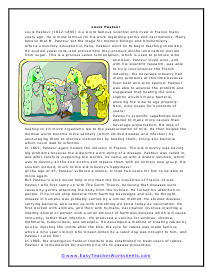
Louis Pasteur Reading Worksheet
He is most famous for his work regarding germs and vaccinations. Many believe that M. Pasteur set the stage for modern biology and biochemistry.

Pasteur Organizer
After a university education in Paris, Pasteur went on to begin teaching chemistry. He studied yeast cells, and proved how they produce alcohol and carbon dioxide from sugar.

Pasteur Multiple Choice Questions
Pasteur loved wine, and with his scientific research, was able to truly revolutionize the French industry: the beverage industry had many problems at this time because their beer and wine spoiled.

Pasteur Short Answer Questions
In 1862, Pasteur again helped the industry in France. The silk industry was having big problems because the silkworms were dying of a disease.
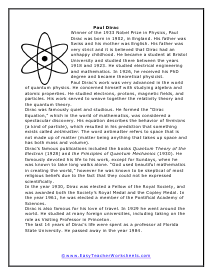
Paul Dirac Reading Passage
Winner of the 1933 Nobel Prize in Physics, Paul Dirac was born in 1902, in England.
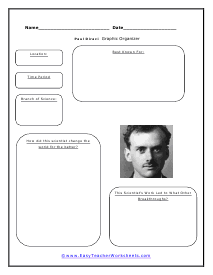
Dirac Organizer
Paul Dirac's work was very advanced in the world of quantum physics. He concerned himself with studying algebra and atomic properties.

Dirac Multiple Choice Questions
Dirac was famously quiet and studious. He formed the "Dirac Equation," which in the world of mathematics, was considered a spectacular discovery.
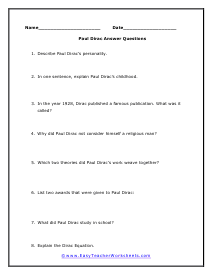
Dirac Short Answer Questions
Dirac is also famous for his love of travel. In 1929 he went around the world.
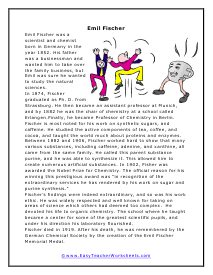
Emil Fischer Reading Worksheet
Emil Fischer was a scientist and chemist born in Germany in the year 1852. His father was a businessman and wanted him to take over the family business, but Emil was sure he wanted to study the natural sciences.
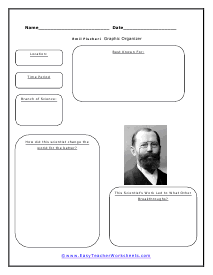
Fischer Organizer
Between 1882 and 1906, Fischer worked hard to show that many various substances, including caffeine, adenine, and xanthine, all came from the same family.
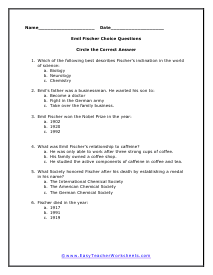
Fischer Multiple Choice Questions
He devoted his life to organic chemistry. The school where he taught became a center for some of the greatest scientific pupils, and under his direction his laboratory flourished.
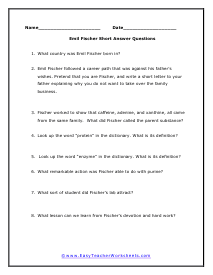
Fischer Short Answer Questions
After his death, he was remembered by the German Chemical Society by the creation of the Emil Fischer Memorial Medal.
Who Were the Most Influential Scientists of All Time?
Our understanding of the world results from the efforts of many great men and women. Some of them made such groundbreaking contributions that they irreversibly changed the course of history.
Here are the four most influential scientists of all time:
- Isaac Newton
- Albert Einstein
- Marie Curie
- Charles Darwin
Throughout history the science community has fought over who made the greatest contributions to the field of science. That is a very difficult concept to quantify. Science in general is broken into two forms, the theoretical and experimental bodies. Theoretical science is based on creating mathematical models that explain some form of interaction between energy and/or matter. Experimental scientists design and carry out the experiments that allows them to take physical and quantifiable observations to prove or disprove these theories. The theoretical scientist is more math driven in their pursuits. The experimental scientist is focus on engineering. Very few scientists throughout history wherever able to master one of the fields, let alone two.
1. Isaac Newton
Have you ever heard the story about a man who saw a falling apple and discovered gravity? That man was Isaac Newton.
Newton was an outstanding English mathematician of the 17th century who was considered the brightest man of his generation. He also established the foundations of modern physics.
While most famous for discovering the universal law of gravity, Newton made many exceptional inventions. He improved the telescope by replacing lenses with mirrors and discovered the spectrum of light during his optics experiments.
Newton also introduced the three fundamental motion laws and the theory of calculus. This was the beginning of the mathematical approach to explaining and describing the universe.
Most famous work: ‘Principia Mathematica’ (1686)
Famous discoveries: Laws of motion, the theory of calculus, light spectrum, gravity.
2. Albert Einstein
Albert Einstein was born in Germany in 1879. Being of Jewish origin, he left Germany with Hitler's rise to power and became an American citizen in 1940, which is why many people know him as an American scientist.
Einstein was not just an influential scientist; he was a superstar. His works truly changed how we see the world and impacted the research of all modern physicists.
Superseding the theory of mechanics created by Newton, Einstein developed the theory of general relativity that introduced the 4-dimensional spacetime. His mass-energy equivalence (E = mc2) is the most famous equation of all time.
Most famous work: ‘Relativity: The Special and the General Theory’ (1916)
Famous discoveries: Theory of general relativity
3. Marie Curie
Marie Curie was the first woman to win a Nobel Prize for her groundbreaking research on radioactivity. She is also the only person to win the Nobel Prize in two fields: physics and chemistry.
Marie was born in Warsaw, Poland, in 1867. At the time, Warsaw was occupied by Russia and belonged to the Russian empire.
Marie and her sister Bronislawa both strived for knowledge, but women were not allowed to receive higher education at their local universities, and their family was too poor to send girls abroad.
These women, however, did not give up. Marie worked as a governess to pay for Bronislawa’s education, and then Bronislawa financed Marie's attending the University of Paris.
Along with her husband Pierre, who gave Curie her famous French last name, Marie discovered the phenomena of radiation. They also discovered two new chemical elements: polonium and radium. Polonium was named after Poland, Marie’s country of origin.
Most famous work: ‘Research on Radioactive Substances’ (1903)
Famous discoveries: Radioactivity, polonium and radium chemical elements.
4. Charles Darwin
Charles Darwin was a 19th-century English biologist. His theory of evolution shook the world. It explained how life forms emerge, change, and develop over time, introducing the theory of natural selection.
Natural selection theory suggests that the most well-adapted creatures are more likely to survive and multiply. Therefore, if a new mutation emerges and proves useful, creatures that have it will soon outnumber those that don’t, and the mutation will secure itself in upcoming generations.
This mechanism explained how various living species' most unbelievable and complex organs naturally developed over time. It was the most elegant answer to the question that challenged generations of scientists.
Most famous work: ‘On the Origin of Species’ (1859)
Famous discoveries: Theory of evolution by natural selection.


